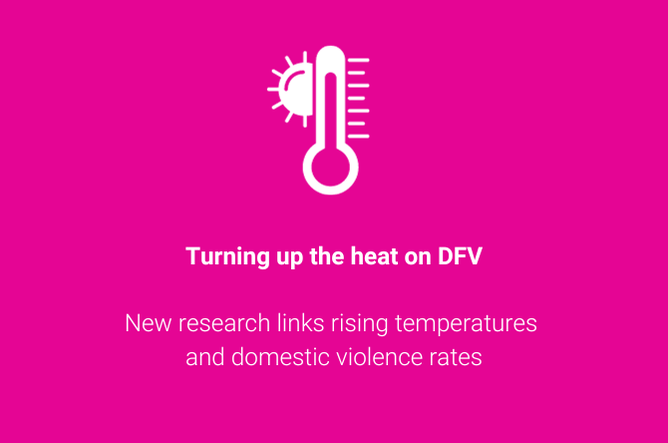Domestic and family violence spikes during the holiday period, and new research reveals why this may be an even bigger issue in Australia.
The new data highlights a relationship between hot temperatures and violence: as temperatures rise, so do incidences of aggression. However, the effect of heat was far greater on domestic violence than any other type of violent crime.
On The Briefing podcast this week, researcher Heather R. Stevens of Macquarie University hypothesised that perpetrators were more likely to use violence within the home during hot summers, due to the effects of heat on mood, the need to seek shelter indoors, and less chance of bystander intervention to stop the violence.
Much of Australia is currently in the grip of a heatwave, and climate change means we can expect more frequent and intense heat events into the future. This will disproportionately affect vulnerable women and children, especially those in rural and remote areas that are already lacking adequate services.
Summer in Australia also coincides with the Christmas and New Year holiday period; the busiest time of year for domestic and family violence support services. A number of contributing factors make summer holidays a ‘perfect storm’ for DFV:
Increased family time and social interactions
Closure of victim-survivors’ safe spaces such as schools, offices and sports clubs
Violence occurring behind closed doors, without ability for bystanders to act
Financial stress
Alcohol and drugs
Social expectations
High temperatures
Spending more time indoors due to heat
Perpetrators of domestic and family violence are usually very careful about hiding their behaviour, so it can be difficult for others to spot the abuse. However, there are some warning signs to look out for:
You hear someone being put down, criticised, humiliated, or ordered around
Their partner is monitoring their phone or social interactions
They don’t seem as happy or social as usual
They mention not having access to money, or control over their own finances
Their appearance has changed - they’re wearing different clothes, or appear less confident
They’re walking on eggshells, or seem to be afraid of upsetting their partner
Rigid gender roles and harmful stereotypes often underpin domestic and family violence, and the majority of perpetrators are men (ABS, 2013). Therefore, it can be very powerful for other men to model respectful behaviours, and speak up about misogynistic or abusive behaviours if safe to do so.
What to do if you witness red flags or abusive behaviour these holidays:
If it feels safe to do so, call out the behaviour, or interrupt the situation. Note that getting involved in confrontation can lead to further abuse for the victim-survivor or witness.
Check in on the person the abusive behaviour was directed at, and let them know it was not okay. Choose a time and place away from the perpetrator.
Let them speak, and listen without judgement.
Refer them to specialist support services. If someone is in immediate danger, phone the police on 000.
Other tips to stay safe over the summer:
Keep in touch with family and friends, especially those who may need extra support around the holidays.
Keep cool - libraries, public pools and parks with shade are great spots to get out of the house, and out of the heat.
Drink responsibly, and model healthy habits in front of children.
Challenge DV wishes you a safe and happy holiday season.



